“A crime has been committed. Reparations is the admission of that crime, one which shocks the conscience of the world.”
 Such is the foundation of the campaigns that Eritha Akilé Cainion and Jesse Nevel are running as candidates for City Council District 6 and for Mayor of St. Petersburg, respectively. They have forced reparations into the mainstream. Still, scholars and legal experts want to keep Reparations their private reserve, some question whether using the term “reparations” is useful, and others argue that the term should be dropped altogether.
Such is the foundation of the campaigns that Eritha Akilé Cainion and Jesse Nevel are running as candidates for City Council District 6 and for Mayor of St. Petersburg, respectively. They have forced reparations into the mainstream. Still, scholars and legal experts want to keep Reparations their private reserve, some question whether using the term “reparations” is useful, and others argue that the term should be dropped altogether.
In the January 28, 2016 Black Agenda Report (BAR), managing editor Bruce A. Dixon had asked some of those questions:
“What would a serious discussion on reparations look like? Will anybody ever come up with a realistic roadmap to get there, or is reparations talk just that — all talk? Is reparations an answer to class politics, or is it the politics of a particular class? And what if we fought for millions of new green jobs, rolling back the prison state, guaranteed annual income, decent housing and free education but didn’t call it ‘reparations’?”
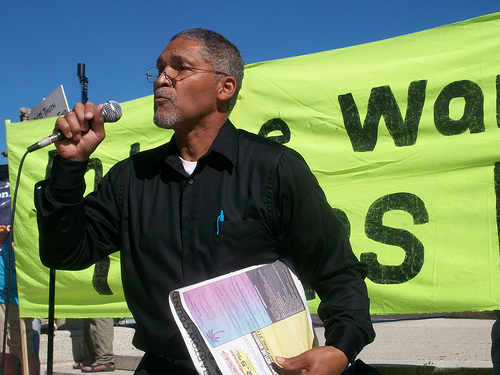
Bruce Dixon.
Black Agenda Report, its Executive Editor Glen Ford (a founding member of the Black is Back Coalition for Social Justice, Peace and Reparations) and Dixon have played an important role in supporting Reparations while opening up the debate and challenging the class character of elements of the Reparations movement. Dixon is rightly scornful of the middle-class approach illustrated in the August 8, 2017 BAR, that “Reparations is Dead” Authors Seek to Spark Public Discussion of New Legal Strategy by Dr. Jahi Issa, Reggie A. Mabry, and Patrick Delices. The article is a near-parody which claims that Reparations should be the exclusive domain of lawyers and scholars:
“[Some other scholar’s] type of ahistorical rebuttal makes our point that reparations strategies be best left to experts in the field that can make better plausible historical and legal arguments. … To this end, we are calling for a Town Hall Meeting to have a professional, academic and intellectual dialogue on the State of the Reparations Movement. We are willing to debate [various important people] who may feel that our new arguments are not grounded with sound scholarship.”
In his January 28 piece mentioned above, Dixon cited an old piece by Adolph Reed from year 2000, “On Reparations” which more directly made the argument that would liquidate the demand for Reparations:
“Concerns like access to quality health care, the right to a decent and dignified livelihood, affordable housing, quality education for all. These are objectives that can be pursued effectively only by struggling to unite a wide section of the American population who experience those concerns most acutely.
“And isn’t it interesting that at such a moment the corporate-dominated opinion-shaping media discover and project a demand for racially defined reparations that cuts precisely against building such solidarity? And isn’t it also interesting that Randall Robinson, mainstream poster boy for reparations advocacy, is a member of the Rockefeller family’s Council on Foreign Relations?” …
“This is a protest politics that depends on the good will of those who hold power. By definition, it is not equipped to challenge existing relations of power and distribution other than marginally, with token gestures.”
Dixon explained:
“Reed holds that reparations is not an answer to the politics of class, it IS the political preference of a very specific class — the black misleadership class” which Dixon defines as “politicians who’ve traded on their own personal branding, as blacks who presumably would defend the interests of other blacks and members of minority groups, and instead have served as operatives for the rich and powerful.”
Dixon, however, takes the discussion further:
“The questions that Reed raises would be the basis for a serious discussion of reparations if such a discussion ever happens. … Serious discussions about reparations will ask whether the heavy political lifting required can be accomplished at all under that name, and if it can, what it would look like. Serious discussion on reparation would take account of its class content and class differentiation among blacks, rather than ignoring it in favor of the fake racial solidarity that allowed the development of the black misleadership class over the last hundred years.”
Carrying it forward …
As much as I like shooting fish in a barrel, I’ll not dwell too long on the academic, scholastic and legalistic players in this discussion. It’s not that they don’t have insights, from a historical point of view. Their attempts at primarily legalistic approaches — that the Black community through some unspecified representatives can take the United States to court and win something, anything for those unspecified representatives through the court system — at best illustrate both the justice of this approach, and its utter futility.
As Reed has correctly pointed out, “This is a protest politics that depends on the good will of those who hold power.” ’Nuff said.
The argument that the Black masses will benefit most from a broad-based united front for basic human needs seems more feasible at first glance. They baldly assert that the strident demand for racially-specific reparations would lose the support of the white working class and the white and Black middle classes. It would destroy their imaginary united front and bring defeat down on us all. Therefore, it’s not just that the call for reparations is marginal and fundamentally irrelevant. Rather, the call for reparations is a menace and a threat to all poor and working people, regardless of race.
That sounds cold-blooded yet perhaps plausible on paper, but it is based on a myth — that there actually is some viable multi-racial working-class movement that is marching side-by-side and arm-in-arm towards something other than minimal reform. There is no such animal. Fact is that the white left as a whole is either explicitly working for the “Reconstruction” of the Democratic Party, or is afraid to challenge it, a handful of independent elements notwithstanding.
St. Petersburg — the alternative in action.
In any debate, choice of venue can be critical. So let us move this discussion out of the Groves of Academe and the Corridors of Power, and get away from the ivory towers and the boardrooms. Let’s join the debate happening right now, in the streets and homes and churches and community centers of St. Petersburg. For St. Pete’s poverty-stricken South Side is Ground Zero for Reparations, where the very word is being redefined by the Akilé and Jesse campaigns.
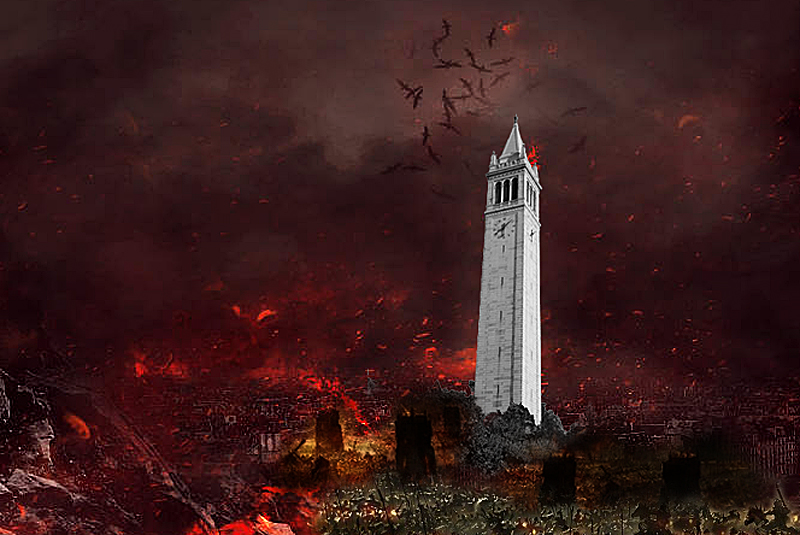 The 20-year-old Akilé is running against the usual crew of hack politicians, particularly the Black misleadership class. The setup is that while the August 29 primary is open only to voters in District 6, the top two vote-getters will then be forced into a runoff with the entire city voting on behalf of the majority Black district, where Blacks are only a bit more than a third of the population. Go figure.
The 20-year-old Akilé is running against the usual crew of hack politicians, particularly the Black misleadership class. The setup is that while the August 29 primary is open only to voters in District 6, the top two vote-getters will then be forced into a runoff with the entire city voting on behalf of the majority Black district, where Blacks are only a bit more than a third of the population. Go figure.
27-year-old Jesse is running against the “two Ricks,” Rick Baker, a former mayor and a Republican, and Rick Kriseman, current mayor and a Democrat. Both are neck deep in corporate money, heart and soul committed to gentrification, standing four-square behind massive policing of the mainly-Black South Side. The organized left is lined up heart and soul with Kriseman, as former Bernie Sanders operatives are desperately trying to herd progressives into the Kriseman camp.
Akilé and Jesse, backed by their supporters, swept all the candidates debates they appeared in (see here for some of that story), so much so that the sole TV debate was restricted to the “two Ricks” and their hand-picked audiences. Any remaining debates were canceled outright.
Holding aloft the banner of Reparations, Jesse has already devastated Kriseman’s campaign. Kriseman and the Democrats have until now been able to count on the Black vote to pull them through. Now Kriseman and Baker are running neck-and-neck, and Kriseman is double-digits behind Baker, his candidacy doomed. The rest of the “side-by-side and arm-in-arm” reformist left is going down with Kriseman. Just as the Bernie Sanders movement, in endorsing Hillary, went down with that ship.
This “side-by-side and arm-in-arm” multi-racial movement has had its day. Historically — at its best — from the New Deal to the Civil Rights movement, and beyond, the Black community has been left holding the bag as soon as the white left ran into hard times. Today, it is completely hollow.
Never has the need for Black leadership been more stark. That is what is emerging on the streets of St. Pete.
Redefinition.
The Jesse and Akilé campaigns have redefined the very meaning of Reparations. First, Reparations is both big and small. It indeed demands payback for all the horrors of the slave trade, the hundreds of years of naked exploitation, disenfranchisement, Klan terror, and grinding poverty. At the same time, its demands are very specific and very current.
- Tropicana Field (aka the “Dome”), home of the Tampa Bay Rays, was built on the destruction of 800 Black homes and an entire community’s businesses on the city’s South Side. Akilé and Jesse want it all back, level the Dome, build affordable housing, and finance local businesses for the Black community.
- While the St. Pete Police and the Pinellas County Sheriff’s Departments murder and terrorize Black youth, the city is spending $85 million on a new police station across from the old one. Take that $85 million and invest it in the South Side community.
- In the past few years, the city has dumped over 250 million gallons of raw sewage onto the streets and into the homes of the South Side. Clean it up and institute a 5-year moratorium on Downtown development. Stop the gentrifiers cold.
Payback has to come from the white power structure, not working people. A key slogan of the campaign is, “Nobody lives at the expense of anyone else. War on the corporations and the gentrifiers and the developers.” The goal of Reparations does not set white against Black, but is designed to unite white people in support of the Black community. Rebuilding the South Side would revitalize the entire city.
Radical times! Radical solutions!
To the Akilé/Jesse campaign, that’s not just some cool “Rah! Rah! Sis boom bah!” cheer to fire up the troops. There’s some cold-blooded political analysis behind it.

The Yamato’s final run.
Radical times? Everybody knows it. Do they like it? No. Everyone knows the U.S. government is broken, the country is breaking down in a thousand ways, unable to get anything done. The inner cities are dying, and the country’s infrastructure is falling apart. Inequality only gets worse while a massive stock bubble is awaiting the next pinprick. The international world order is coming apart at the seams. From Korea to Latin America to the Middle East. Brexit, Ukraine, South China Sea. A deranged Donald Trump has his finger on the nuclear button, and a deranged Hillary Clinton complains that Trump is not belligerent enough!
So Dixon has asked a hard realpolitik question:
“Serious discussions about reparations will ask whether the heavy political lifting required can be accomplished at all under that name.”
I would give a hard realpolitik answer:
Without the battle cry of Reparations, that “heavy political lifting” cannot be done at all.
Reparations is the radical solution!
Who in their right mind can argue that anything less than radical solutions are demanded? But Radical solutions are useless without addressing the question of power.
The whole colonialist system is being driven off a cliff. The white social bedrock of that system is seeing it, and is becoming more and more terrified. Some of that white bedrock would lash out with deadly racist violence of every sort to reinforce the system they cling to. Others clutch ever more tightly to a liberal opposition that is not really any opposition at all. More are just adrift. The left is adrift.
Yes, there is a left. But they are not radical. Leftist commentators like those on Counterpunch and Jacobin are most astute in pointing out how utterly corrupted the system is. They stand for all the right things. The best of them even complain that while the left is fighting for this, fighting for that, there is no radical challenge to capitalism itself. Alas, they end up settling for the same old shit and more of it. When the question is posed as “Reform or Revolution,” Reform always wins by default. But these days, even reforms require power that the reformers don’t have.
Akilé states, “Reparations is just another word for Revolution!” The beauty of Reparations is that it embraces both Reform and Revolution under one banner and generates power. No reform is merely an end in itself, but rather one step in a long journey for justice.
There’s an old tune that has a line …
“Justice thunders condemnation!”
There is great power in justice, to make whole for a crime “which shocks the conscience of the world.” The Black community is crying out for justice. The hard realpolitik is that the driving engine for progress and justice in America is the working class and poor Black community.
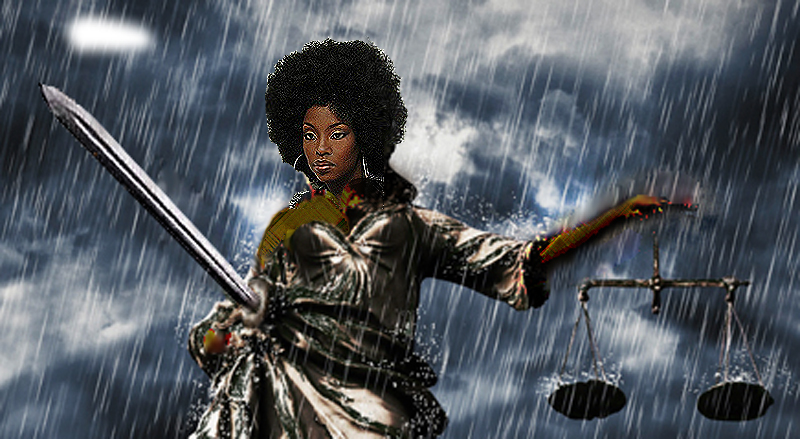 The Black community cannot wait for the white community to get its shit together. Justice through Reparations has to be fought under Black leadership. If you drop the word Reparations, you drop the cry for justice. If you drop the word Reparations, you thereby deprive the working-class Black leadership of one its most potent weapons.
The Black community cannot wait for the white community to get its shit together. Justice through Reparations has to be fought under Black leadership. If you drop the word Reparations, you drop the cry for justice. If you drop the word Reparations, you thereby deprive the working-class Black leadership of one its most potent weapons.
The good news is that winning that fight for justice, if it is to be won at all, requires breaking the system that oppresses us all.
So here we are, fighting a good fight, one campaign on the South Side of one Florida city of 261,000 people. But it’s a very big country. Can that fight actually be won north and south and east and west? Yes, it can be won.
There are South Sides all over this country, Black communities gripped by poverty, being obliterated by gentrification, held down by police violence, and starving for economic development. There is massive anger and despair. They are living the American Nightmare. There are also millions upon millions of confused and frightened white people, appalled at what has happened to their American Dream, looking ahead to an uncertain future. Together they are dry tinder waiting for a match. Waiting for leadership.
What makes St. Pete special, in a way, is that St. Pete has revolutionary leadership, from the African People’s Socialist Party and its Chairman Omali Yeshitela (a leader of the Black is Back Coalition), and revolutionary leadership from Eritha Akilé Cainion and Jesse Nevel. This campaign didn’t just materialize out of nowhere. It has developed an effective organization based on 50+ years building in the community. It is able to run a powerful and viable campaign. It is demonstrating what can be done.
And the good news is that nobody elsewhere has to wait their own 50 years to build their own fight for Reparations. That experienced leadership is available right now.
— Jeff Roby
August 15, 2017
To donate to the Jesse Nevel campaign, go to: http://jessenevel.com/donate/
To donate to the Eritha Akilé Cainion campaign, go to: http://akilefordistrict6.com/donate/index.html
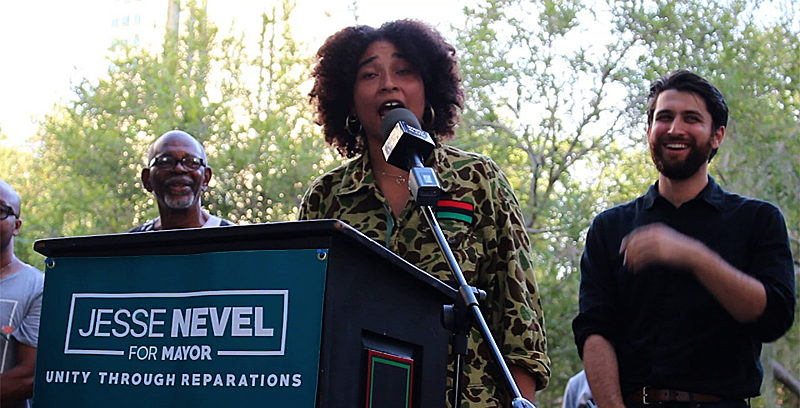
Chairman Omali Yeshitela, Eritha Akilé Cainion, and Jesse Nevel.

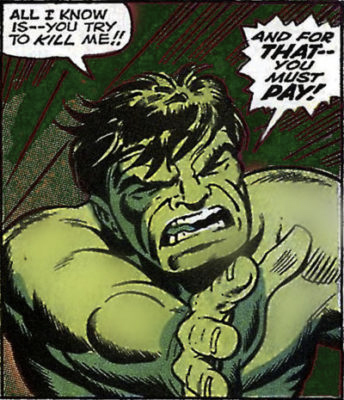
brilliant comprehensive piece. St. pete needs a political revolution and this election is our time to seize it.
I support both candidates…. Eritha & Jesse! Tha Chairman Omali Yeshitela said We could win And I actually believe it! I dont watch the news but if YOU do how could you look at it and not think to yourself, Radical Times, Radical Solutions! It’s past Time!